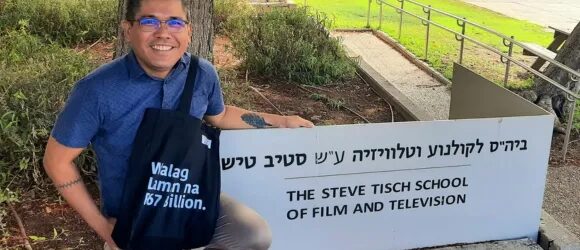Kristoffer Brugada is now in his second year of the international MFA in Documentary Cinema at Tel Aviv University. Currently working on his final project, a documentary on gay conversion therapy in the Philippines, Brugada reflects on his time in the program and the valuable lessons he’s gained.
Choosing TAU
In 2022, Brugada was searching for a master’s program that would help him grow as a filmmaker. “I applied to several universities, but Tel Aviv University’s program stood out. When I compared the curriculum, it felt more comprehensive in terms of what they teach and the topics discussed in class,” he says. A scholarship from TAU was another deciding factor in his choice.

MFA class
The diversity of the class and the collaborative nature of the program were also a strong draw. “Our class was a mix of ages and backgrounds, from filmmakers to urban planners. We had heated discussions, especially in the ethics class, but we learned so much from each other.
“Documentary filmmaking may be a solitary job, but making a film is a collaborative effort, and I loved that we supported each other.”
In addition, Brugada appreciates the progressive outlook of Tel Aviv University.
Refining Technique and Debating Ethics
As a filmmaker with 20 years of experience in TV production and independent documentaries, Brugada wasn’t new to the world of film. Yet, the program’s hands-on directing courses taught by top Israeli practitioners allowed him to experiment with new techniques and refine his craft. “I’ve done documentaries before, but the program pushed me to further develop my style. The directing courses gave me the freedom to experiment and find my voice,” he says.

Throughout the program, Brugada did several creative assignments that allowed him to apply what he was learning. These projects involved shooting, editing, and directing his own films. One of his notable assignments was a documentary on the Filipino community in Tel Aviv.
“I introduced my classmates to my culture through the Filipino workers here in Israel.”
His project on the annual beauty pageants for caregivers, a beloved tradition from the Philippines that has made its way to Israel, was a hit with his classmates. “They found it fascinating how these caregivers, despite their hard work, still found joy in community events.”
Brugada’s short on beauty pageants in Israel
The university provided equipment, including Sony FS5 cameras and editing suites, but Kristoffer brought his own gear, which allowed him to film more flexibly.
“The equipment at the university is great. As a teacher back in the Philippines, I really appreciated the quality of the resources available at TAU.”
As for the theoretical courses, the one on ethics in documentary filming stood out the most. The course focused on the responsibilities filmmakers have when dealing with real people: “We have to assess what we can show and how it impacts both the audience and the subjects. I really loved those discussions,” he recalls. The program’s emphasis on ethical considerations helped him navigate sensitive topics, like the subject of his final film, with care and respect.
On top of that, getting to know more about the Israeli cinema landscape and learning about new theories of documentary filmmaking was something Brugada liked a lot.
Bringing the Vision to Life
During the second year, students work on their final project, a documentary film that they create individually or in teams. Brugada’s project, Going Straight, tackles a sensitive topic of gay conversion therapy in the Philippines.
“I wanted the film to be a venue for discussion about extreme fundamentalism and giving grace, love, and understanding instead of judgment.”

During Pride March shoot in Tel Aviv
The topic has been on his mind since 2017, but it was at TAU that he found the support and resources to bring the project to life.
“The university’s Blavatnik Fund gave me financial support to finish the film.”
TAU professors, including Ran Tal and Netalie Braun, provided guidance on how to shape the narrative and decide which scenes to include. “We had to present sample scenes to the final film committee, who then gave us advice on which direction to take. Their feedback was crucial in helping me refine the story,” he says.

Brugada (right) with fellow students during Cinematography class
Now in post-production stage, Brugada plans to submit Going Straight to international festivals, with hopes of premiering it at a top-tier event.
“I want to show it to the world. It’s a story that needs to be told, and I’m grateful to TAU for giving me the support to tell it.”
Filmmaking, Teaching, and New Career Milestones
Brugada’s journey as a filmmaker doesn’t stop at the completion of his final project. In fact, he’s already sharing his knowledge and experience with the next generation of filmmakers.
“I’ve been teaching documentary production, screenwriting, and television production for a while now.”
After finishing his MFA, he hopes to continue teaching, potentially at the master’s level, and is even considering pursuing a PhD.
In addition, Brugada has also been invited to serve on the jury at the prestigious Japan Prize, a festival focused on educational media. “It’s a great opportunity to engage with filmmakers from around the world and see the incredible work being done in the field of educational film and television,” he says.
With his film nearing completion, his teaching responsibilities growing, and exciting opportunities like the Japan Prize ahead, Kristoffer’s career as a filmmaker and educator shows no signs of slowing down.
“I have other films that I shelved before that I would want to go back to and work on.”
Brugada remains dedicated to his craft and passionate about the stories he tells, grateful for the experiences and support he’s found at Tel Aviv University.
